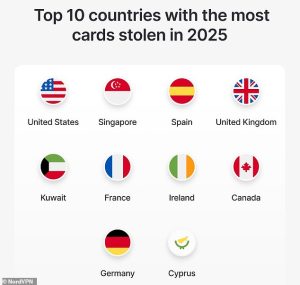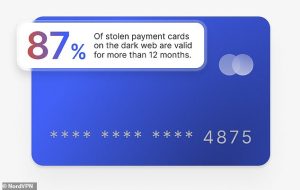Key Takeaways
- 1,804 UK bank cards found for sale on dark web
- Average price just £6.27 – cheaper than a pint
- 87% of stolen cards remain valid for over 12 months
- UK ranks 4th globally for stolen card availability
Cyber security experts have uncovered more than 1,800 stolen UK payment cards being sold on the dark web at shockingly low prices. The average British card costs just £6.27 – less than the price of a pint – marking what experts call a “cost-of-hacking crisis.”
According to NordVPN researchers, UK citizens are popular targets for card theft due to the country’s strong digital economy and widespread online shopping habits. British cards are particularly valuable internationally because of higher average incomes and the strong pound.
Global Ranking of Stolen Cards
The UK ranks fourth worldwide for stolen card availability on dark web marketplaces, with only the United States (30,540 cards), Singapore (5,484) and Spain (5,090) having more compromised cards available. Other countries in the top 10 include Kuwait, France, Ireland, Canada, Germany and Cyprus.
Only United States, Singapore, and Spain have more citizens’ payment cards available to buy on the dark web than the UK
Rising Prices and Long Validity
The average price for UK stolen cards has increased 38% since 2023, rising from £4.56 to £6.27. Globally, prices vary significantly with Japanese cards commanding the highest average at £18, while Cypriot cards are among the cheapest at just £1.41.
Marijus Briedis, NordVPN’s Chief Technology Officer, warned: ‘Cyber attacks, card skimming or a simple physical loss of a card can see your payment details up for grabs online. Cards are frequently sold in bulk and stay valid for long periods, and can be cashed out locally.’
Alarmingly, 87% of stolen payment cards remain valid for more than 12 months, giving criminals ample time to exploit them for fraud, account takeovers, and direct theft of funds.
Protection Measures
Security experts recommend several precautions to keep card details safe:
- Monitor statements regularly and enable real-time transaction alerts
- Avoid suspicious websites and use digital wallets with multi-factor authentication
- Be vigilant against phishing emails and card skimming devices
- Use strong, unique passwords and avoid saving payment data in browsers
Mr Briedis emphasized that while banks have robust security measures, consumers should immediately contact their bank if they suspect their details have been compromised.







